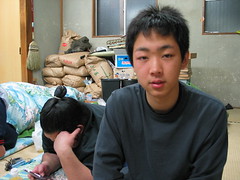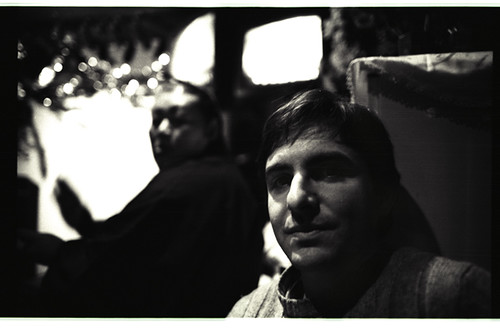Stablemates III

HARUKI, THE YOBIDASHI
When Haruki was four, his family moved to Tokyo from Beijing, where he was born. His father's father was Japanese and his parents thought they'd have a better chance of carving out a decent life for themselves in Japan. Within a couple years, they'd opened a Chinese restaurant on the northern fringe of the city, where a friend of the Kashira was a regular customer. Through the Kashira's friend, they met the Oyakata, who offered Haruki a spot in the stable when he got old enough.
Haruki never wanted to join the stable. "My parents decided," he said. "It had nothing to do with me." His parents loved sumo, he told me, and wanted him to be a wrestler. And while he didn't say so explicitly, they probably were also trying to figure out what to do with Haruki, whose disdain for schoolwork must have caused them some distress. "I hated school," he told me. "I never studied."
But as Haruki grew older, his chances of success as a wrestler appeared to be diminishing. He stopped growing and had a rot-rod metabolism that burned calories faster than he could consume them, keeping him rail thin. It seemed like he was even less cut out for sumo wrestling than for the academic life.
The Oyakata, however, was determined to hold up his end of the deal. He had agreed to let Haruki into the stable and apparently remained committed to doing so. "He said, 'If you can't be a wrestler, be a yobidashi,'" Haruki recalled. So last April, after graduating from middle school, the 16-year-old moved into the stable to begin his career as a sumo announcer.
Haruki said he hated sumo wrestling when he joined the stable, but he got to like the guys in the stable and is now merely indifferent to the sport. "I don't like it," he said. "But it beats studying."
Like wrestlers, yobidashi have ranks, determined mostly by their time on the job. As a new yobidashi, Haruki announces tournaments matches between the lowest-ranked wrestlers that fight early in the morning. Yobidashi also beat drums each morning of the tournament when wrestling starts, sweep the dohyo between fights, and hold up flags bearing the logos of companies offering prize money to the winners of particular matches.
"It’s not a hard job, but it's embarrassing," Haruki said. "I hate standing up in front of so many people."
Between tournaments, a yobidashi's responsibilities are minimal. He might have to help make a stable's practice dohyo here and there, but that's about it. So he wakes up, watches a bit of the morning practice, sweeps out the vestibule, waits until lunch, takes a nap, does some cleaning, eats dinner, then reads comics and plays video games until bed. It's more or less the same daily schedule that the wrestlers follow, minus the wrestling.
NEXT: Pride



<< Home